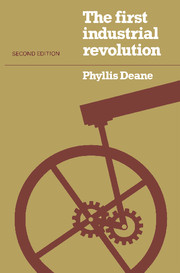Book contents
- Frontmatter
- Contents
- Preface to the first edition
- Preface to the second edition
- 1 The starting-point
- 2 The demographic revolution
- 3 The agricultural revolution
- 4 The commercial revolution
- 5 The transport revolution
- 6 The cotton industry
- 7 The iron industry
- 8 The sources of innovation
- 9 The role of labour
- 10 The role of capital
- 11 The role of the banks
- 12 The adoption of free trade
- 13 The role of government
- 14 Economic growth and economic cycles
- 15 Standards of living
- 16 The achievement
- Guide to further reading
- Subject index
- Index of authors cited
Preface to the first edition
Published online by Cambridge University Press: 04 August 2010
- Frontmatter
- Contents
- Preface to the first edition
- Preface to the second edition
- 1 The starting-point
- 2 The demographic revolution
- 3 The agricultural revolution
- 4 The commercial revolution
- 5 The transport revolution
- 6 The cotton industry
- 7 The iron industry
- 8 The sources of innovation
- 9 The role of labour
- 10 The role of capital
- 11 The role of the banks
- 12 The adoption of free trade
- 13 The role of government
- 14 Economic growth and economic cycles
- 15 Standards of living
- 16 The achievement
- Guide to further reading
- Subject index
- Index of authors cited
Summary
In recent years economists and policy makers have become increasingly concerned with questions of economic growth, and in particular with the problem of identifying the route by which today's poor countries might reach the high standards of living presently enjoyed by the industrial societies. Historians too have been impelled by the urgent contemporary problem to analyse their material in a new way, to apply the concepts of the economic-growth theorists and to seek the explanations underlying the relatively few cases of successful industrialization.
This book, which originated in a course of lectures given for undergraduates reading for Part I of the Cambridge Economics Tripos, is a product of the current interest in economic development. It is a study of the development of the British economy over the period 1750–1850 when the first industrial revolution took place and modern economic growth effectively began. The fact that the crucial break-through was achieved spontaneously and without the advantages of either planning or foresight seems to give it a special relevance to the problems of countries which are currently finding it difficult to begin or to sustain a process of industrialization. This is an attempt to apply the concepts and techniques of development economics to a vital section of the historical record.
Except in so far as it embodies some of the results of an inquiry into British economic growth which Dr W. A. Cole and I carried out at the Department of Applied Economics some years ago, it is not the product of original research.
- Type
- Chapter
- Information
- The First Industrial Revolution , pp. vii - viiiPublisher: Cambridge University PressPrint publication year: 1980



